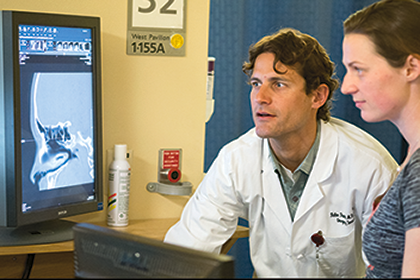
Kalev Freeman, M.D., Ph.D., Receives Grant for Groundbreaking Research in Trauma-induced Coagulopathy
Kalev Freeman, M.D., Ph.D., Receives Grant for Groundbreaking Research in Trauma-induced Coagulopathy
Kalev Freeman, M.D., Ph.D., director of the Larner College of Medicine’s Trauma Physiology Lab and associate professor of emergency medicine and pharmacology, has been awarded a significant research grant by the National Institute of Health/National Heart Lung and Blood Institute (NIH/NHLBI). This grant, totaling $12,130,497, with $1,381,965 designated for the University of Vermont (UVM) over a span of five years, underscores Freeman’s pioneering work in the field of trauma-induced coagulopathy.
Freeman’s research is part of the Trans-Agency Consortium for Trauma Induced Coagulopathy (TACTIC) program, which received initial funding from NHLBI UMI, a cooperative agreement, in 2013. TACTIC has proven to be a collaborative powerhouse, resulting in over 200 peer-reviewed research publications and groundbreaking discoveries in understanding the intricate relationship between dysregulated inflammation, coagulation, and fibrinolysis (blood clotting problems) following trauma.
Furthermore, TACTIC’s innovative approach, built on a partnership between different types of scientists, clinicians, clinical trials, and a specialized biorepository, served as the basis for the NHLBI-funded Accelerating COVID-19 Therapeutic Interventions and Vaccines (ACTIV4) program. Under the leadership of TACTIC investigators, ACTIV4 played a critical role in rapidly uncovering insights related to treating blood clotting thrombotic issues in COVID-19 patients, highlighting TACTIC’s ability to turn research into practical solutions.
Freeman and his team, alongside fellow researchers at Pitt Medicine, have demonstrated the life-saving potential of plasma transfusion in severe trauma cases through carefully controlled experiments; however, the precise mechanisms behind this therapy remain a puzzle. The newly awarded multi-PI R01 grant will provide TACTIC with the resources needed to unravel this important mystery.
Emergency care is a critical area for research. It is already proven that prehospital care therapies, such as thawed blood plasma administered even before the patient makes it to the hospital, can significantly increase the odds of survival. In 2018, a clinical trial led by Freeman’s collaborators at the Pitt School of Medicine successfully demonstrated that trauma patients at risk of hemorrhagic shock who received two units of blood plasma during air medical transport were 10 percent more likely to survive than those who did not.
Principal investigator Matthew Neal, M.D., co-director of the Trauma and Transfusion Medicine Research Center at the University of Pittsburgh School of Medicine and director of emergency general surgery at UPMC, explained that the leading cause of death after injury is uncontrolled bleeding, when patients can develop a challenging condition called “trauma-induced coagulopathy,” which involves abnormal blood clotting.
“Patients with trauma-induced coagulopathy are at risk for both bleeding and clotting complications that can be life threatening,” said Dr. Neal. “This grant extends nearly a decade of work to try to eliminate this merciless and vexing condition. We have combined a team of experts from across the globe to understand the basic mechanisms of what happens in blood vessels and organs after injury, and how we can intervene to improve outcomes.”
The current project, titled “Endothelial Dysfunction and Restoration in Trauma Induced Coagulopathy,” will explore the how plasma transfusions can help restore the health of the endothelium—a specialized layer of cells lining the inside of blood vessels—and test innovative therapies aimed at improving the outcome of trauma patients. It will also help researchers better understand the role of the endothelium in regulating the body’s response to trauma-related blood clotting.
“When we suffer from injuries, blood clotting prevents excessive bleeding. Surprisingly, trauma patients often lose the ability to make their blood clot. Our team has worked to unravel the mystery behind these clotting problems,” stated Freeman. “We discovered that injury to the endothelium—the delicate, contiguous surface connecting every blood vessel in the body—is a key mechanism. We are using this information to develop treatments that will help trauma patients survive and recover.”
Freeman’s unwavering commitment to advancing scientific knowledge and enhancing patient care in the field of trauma-related blood clotting has garnered recognition and support. This grant represents a significant milestone in his research journey, with the potential to transform trauma care and save countless lives.